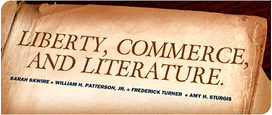We seem to be moving as a group toward the idea that the failure of classical liberal ideas to get a hearing in the literature of our times may have a solution. Those ideas are alive and well in the popular “sub-literary” genres of science fiction, detective stories, westerns, romances, action novels, and “juvenile” fiction. The generally left-wing literary academy pulled off a bit of a coup in so classifying literature that was not advocating its favorite ideas and lifestyles. “Genre fiction” generally embodies classical liberal themes of individual responsibility, earned respect, reward for courage and good work, personal integrity, loyalty, a questioning but faithful allegiance to tradition, and mistrust of politically correct bureaucratic rules (think Dolores Umbridge, the smarmy sadistic headmistress in the Harry Potter series).
During my own recent studies of epic grand narratives from all over the world (soon to appear under the title Epic: Form, Content, History) I was struck by the way that the new generation of our own times has so thoroughly opted against the “mainstream” novelistic universe, with its implied acceptance of “political correctness,” the social construction of reality, the need for “self-esteem” and a therapeutic rather than moral judgement of behavior. Instead, the youth culture has turned to the ancient heroic and epic themes, in action comics blockbusters, multi-user Dungeon games, rock concerts, creative anachronism, and so on. “Epic” is a big buzz-word among them.
Interestingly enough, there is a hard-headed understanding of market forces in these genres–in the games you have to earn your promotion to a higher level by hard work and gold pieces (or pay a Chinese GP farmer to earn it for you) and the super-hero is often opposed to corrupt city authorities or totalitarian national governments. Individual moral clarity trumps the relativism of a “caring” State. The Hunger Games pits hardworking locals against an effete bicoastal mainstream-media bureaucracy. Students will flock to classes on myth, ancient epics, grand narratives, and hero tales as if they had been deprived by their elders of their birthright.
So all is not lost.

